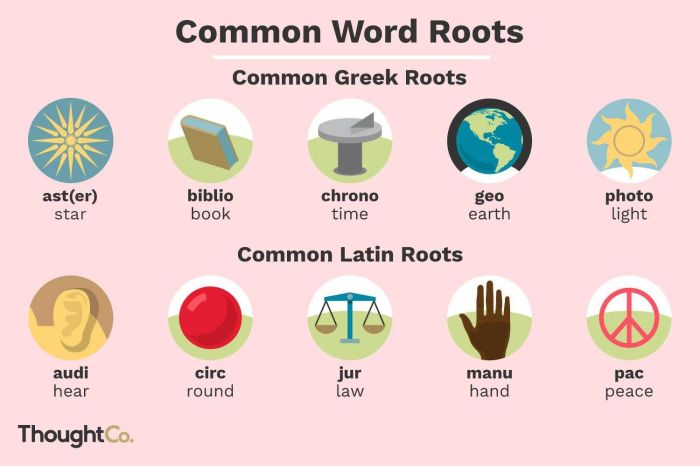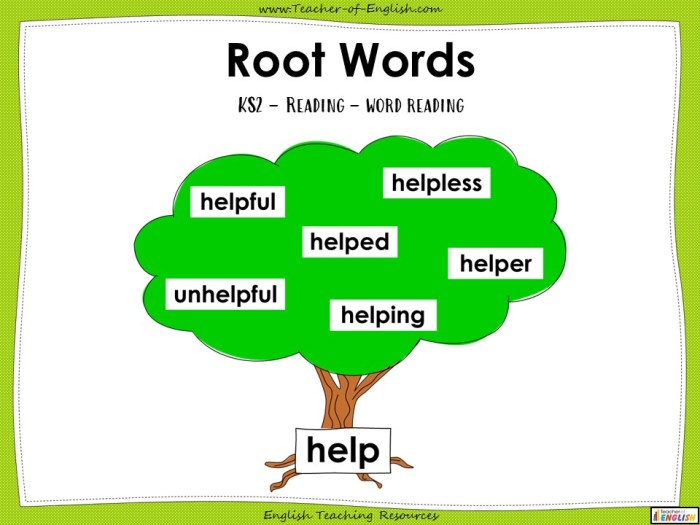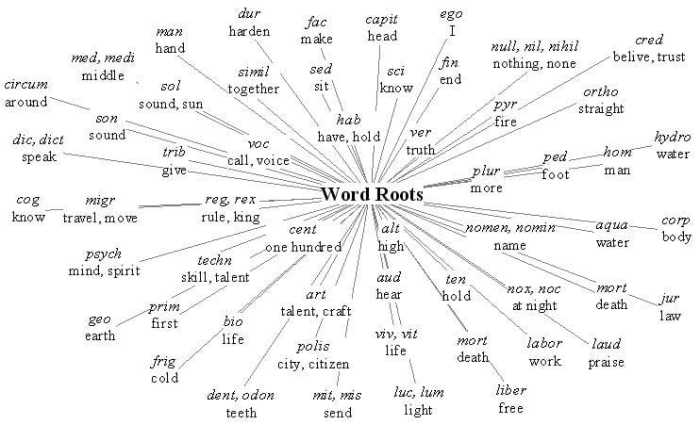Words with the root word voc, such as vocabulary, vocation, and vocal, play a significant role in our language. These terms, with their shared linguistic heritage, offer a fascinating glimpse into the evolution of language and the ways in which we communicate.
Their etymological origins in Latin and their subsequent spread across various languages have shaped their meanings and usage, creating a rich tapestry of linguistic connections.
Introduction

Words with the root word “voc” refer to terms associated with the human voice, speaking, or sound. The root word “voc” originates from the Latin word “vox,” meaning “voice.” This root word is commonly found in various English vocabulary, often related to the act of speaking, uttering, or producing sounds.
Etymology and Origin
The Latin word “vox” has Indo-European roots, tracing back to the Proto-Indo-European word “*weǵʰ-,” which means “to speak” or “to utter.” This root word has given rise to numerous words across various Indo-European languages, including the English word “voc” and its derivatives.
Etymology and History
Words with the root word “voc” trace their origins back to the Latin term “vox,” meaning “voice.” This root has been adopted into numerous languages, where it has evolved and acquired new meanings.
Historical Context and Usage
In ancient Rome, “vox” was closely associated with the concept of free speech and political expression. The Roman orator Cicero famously proclaimed, “Vox populi, vox Dei” (“The voice of the people is the voice of God”). This phrase emphasized the importance of listening to the will of the people in democratic governance.
Words with the root word “voc” have a common thread of relating to the voice. They evoke a sense of sound and expression. Speaking of sound, have you heard of Andrea Mock? Her husband’s identity has sparked curiosity, and you can find out more about it here . Returning to our vocal roots, words like “vocalize” and “vocation” capture the power and purpose of the voice.
Over time, “voc” has taken on additional meanings, including “call,” “summon,” and “invite.” In the Middle Ages, the term “vocation” emerged to describe a divine calling or a person’s life purpose. In the modern era, “voc” continues to be used in various contexts, including music, education, and law.
Semantic Analysis

Words with the root word “voc” share a common theme of “voice” or “calling.” However, they vary in their specific meanings and usage, forming distinct categories based on their semantic nuances.
One broad category encompasses words related to the act of speaking or expressing oneself verbally. This includes terms like “vocalize,” “vociferate,” and “vocation,” which respectively refer to producing sounds with the voice, speaking loudly or forcefully, and a person’s occupation or calling.
Sub-category: Speech and Expression
- Vocalize:Utter sounds or words with the voice.
- Vociferate:Speak or shout loudly and forcefully.
- Vocation:A person’s occupation or calling, typically involving a specific skill or purpose.
Another category centers around words that convey a sense of summoning or calling out. This includes terms like “vocative,” “convoke,” and “revoke,” which respectively refer to a grammatical case used to address someone directly, to call together a group of people, and to cancel or withdraw something.
Sub-category: Summoning and Calling
- Vocative:A grammatical case used to address someone directly, often indicated by an exclamation mark.
- Convoke:Call together a group of people, especially for a formal meeting or event.
- Revoke:Cancel or withdraw something, such as a law, permission, or privilege.
Finally, there is a category of words that relate to the concept of emptiness or absence. This includes terms like “vacant,” “vacate,” and “vacuum,” which respectively refer to being empty or unoccupied, to leave a place empty, and to create a space devoid of matter.
Sub-category: Emptiness and Absence, Words with the root word voc
- Vacant:Empty or unoccupied, especially referring to a room, building, or position.
- Vacate:Leave a place empty, typically by moving out or removing belongings.
- Vacuum:A space devoid of matter, often referring to a region in space or a device that removes air or gas.
Phonological Patterns
Words with the root word “voc” often exhibit distinct phonological patterns that influence their pronunciation and spelling.
One notable pattern is the presence of the voiceless velar fricative /k/ sound, as in “vocal” and “vociferous.” This sound is typically produced with the back of the tongue raised towards the soft palate, creating a distinctive “k” sound.
Spelling Variations
The root word “voc” can also undergo spelling variations, particularly in the initial syllable. For instance, in words like “vocation” and “vocative,” the “o” is often pronounced as /oʊ/, creating a diphthong sound. This variation in pronunciation is reflected in the spelling, with the “o” followed by a “u” to indicate the diphthong.
Morphological Structure
Words with the root word “voc” exhibit a rich morphological structure, employing prefixes, suffixes, and infixes to form new words and express various meanings.
Prefixes
Prefixes are added to the beginning of the root word to modify its meaning. Some common prefixes used with “voc” include:
-
-*in- (not)
invoke(call upon) → invoke(call back)
-*re- (again)
vocation(calling) → revocation(calling back)
-*con- (with)
vocal(relating to the voice) → convocal(calling together)
Suffixes
Suffixes are added to the end of the root word to change its part of speech or meaning. Common suffixes used with “voc” include:
-
-*-al (pertaining to)
vocal(relating to the voice) → vocalization(act of vocalizing)
-*-ist (one who does something)
vocation(calling) → vocalist(one who sings)
-*-tion (action or process)
vocate(call) → vocation(calling)
Infixes
Infixes are inserted within the root word to modify its meaning. A common infix used with “voc” is:
-*-i- (act of)
vocate(call) → evocation(act of calling)
Syntactic Functions
Words with the root “voc” can perform various syntactic functions in sentences, acting as different parts of speech.
They can function as nouns, verbs, adjectives, or adverbs, contributing to the sentence’s grammatical structure and meaning.
Nouns
- Invocation:A solemn appeal or prayer for help or guidance.
- Advocate:A person who speaks or writes in support of a cause or person.
Verbs
- Vouch:To guarantee or endorse something as true or reliable.
- Invoke:To call upon or use something, especially in a formal or official way.
Adjectives
- Vocal:Relating to the voice or speaking.
- Vociferous:Noisy or loud, especially in expressing an opinion.
Adverbs
- Vocally:Using one’s voice or speech.
Lexical Relationships: Words With The Root Word Voc
Words with the root word “voc” share a common core meaning related to voice or sound. They exhibit various lexical relationships, including synonymy, antonym, homophony, and other related terms.
Exploring these relationships helps us understand the nuances of meaning and usage associated with “voc” root words.
Synonyms
Words with the “voc” root that share similar meanings include:
- Vocal:Relating to the voice or sound production.
- Vociferous:Making a loud noise or outcry.
- Vocative:A grammatical case used to address someone directly.
Antonyms
Words with the “voc” root that express opposite meanings include:
- Voiceless:Not producing or involving sound.
- Taciturn:Reserved or uncommunicative.
Homophones
Words with the “voc” root that sound the same but have different meanings and spellings include:
- Vocate:To call or summon.
- Vocation:A job or profession.
Related Terms
Other words related to the “voc” root include:
- Vocabulary:A set of words used by a particular language.
- Vocalist:A singer.
- Vocal cords:The folds of tissue in the larynx that vibrate to produce sound.
Usage in Different Contexts

Words with the root word “voc” are versatile and appear in various contexts, from literature to everyday speech. Their usage can evoke distinct stylistic and rhetorical effects.
Literature
In literature, “voc” words often convey emotions and ideas related to the voice. For example, “vocalize” can describe expressing oneself through speech, while “vociferous” suggests a loud and assertive voice. Authors may use these terms to create characters with distinct voices and personalities.
Media
In media, “voc” words are frequently used to describe communication and public discourse. News reports may employ terms like “vocal majority” to refer to a group expressing strong opinions, while entertainment shows may use “vocalist” to denote a singer.
Everyday Speech
In everyday speech, “voc” words are commonly used to describe vocal qualities or communication styles. People might refer to someone as “vocally talented” or “vocally expressive.” Additionally, terms like “vocabulary” and “vocal cords” are widely used in non-technical contexts.
Cross-Cultural Comparisons

Words with the root “voc” traverse cultural boundaries, carrying nuances shaped by diverse linguistic and societal contexts. This section delves into the cross-cultural tapestry of these terms, exploring how their meanings and interpretations vary across languages and cultures.
Cultural Influences on Meaning and Interpretation
The cultural milieu in which a word is embedded exerts a profound influence on its semantics. In cultures that emphasize the spoken word, terms like “vocation” and “vocal” may carry greater weight and significance. Conversely, societies that prioritize written communication may place more emphasis on the written form of these words, such as “vocabulary” and “vociferous.”
Cultural norms and values also shape the connotations associated with these terms, influencing their usage and interpretation.
Conclusion
The analysis of words with the root word “voc” has revealed several key findings. Firstly, the root word “voc” has a rich history and etymology, originating from the Latin word “vox” meaning “voice.” This root word has been widely adopted in English and other languages, giving rise to a diverse range of words related to speech, sound, and language.
Semantically, words with the root word “voc” encompass a broad spectrum of meanings, including those related to the production and perception of sound, the expression of ideas through language, and the study of language itself. Phonologically, these words exhibit a variety of patterns, including the presence of initial consonant clusters, medial vowel changes, and final consonant clusters.
Morphologically, words with the root word “voc” can be classified into different word classes, including nouns, verbs, adjectives, and adverbs. Syntactically, they can function in various roles within sentences, such as subjects, objects, complements, and modifiers.
In terms of lexical relationships, words with the root word “voc” form a cohesive semantic field, with many words sharing related meanings and exhibiting synonymy, antonymy, and hyponymy. The usage of these words in different contexts varies widely, ranging from formal academic writing to informal everyday speech.
Cross-culturally, words with the root word “voc” have been adopted into many languages, reflecting the universal importance of speech and language in human communication. The analysis of these words provides valuable insights into the linguistic and cultural diversity of human languages.
Significance and Implications
The research on words with the root word “voc” has significant implications for various fields of study. In linguistics, it contributes to our understanding of the historical development of language, the formation of semantic fields, and the interplay between phonology, morphology, syntax, and semantics.
In education, this research can inform the teaching of vocabulary and language skills, particularly for students learning English as a second language. By understanding the etymology, semantics, and usage of words with the root word “voc,” educators can effectively guide students in expanding their vocabulary and developing their linguistic competence.
In communication studies, this research sheds light on the role of language in shaping our perceptions, interactions, and cultural values. By examining the nuances of words related to speech and language, we can gain a deeper understanding of how communication influences our social and cognitive processes.
Overall, the analysis of words with the root word “voc” provides a valuable foundation for further research in linguistics, education, communication studies, and other related fields. It highlights the importance of language as a fundamental aspect of human cognition, culture, and society.
FAQ
What is the origin of the root word voc?
The root word voc originates from the Latin word vox, meaning “voice.” This Latin root has given rise to a wide range of English words related to voice, speech, and language.
How can I expand my vocabulary of words with the root word voc?
To expand your vocabulary of words with the root word voc, pay attention to the etymology of words you encounter. Reading widely and engaging with different forms of media can expose you to a diverse range of vocabulary, including words with the root word voc.
